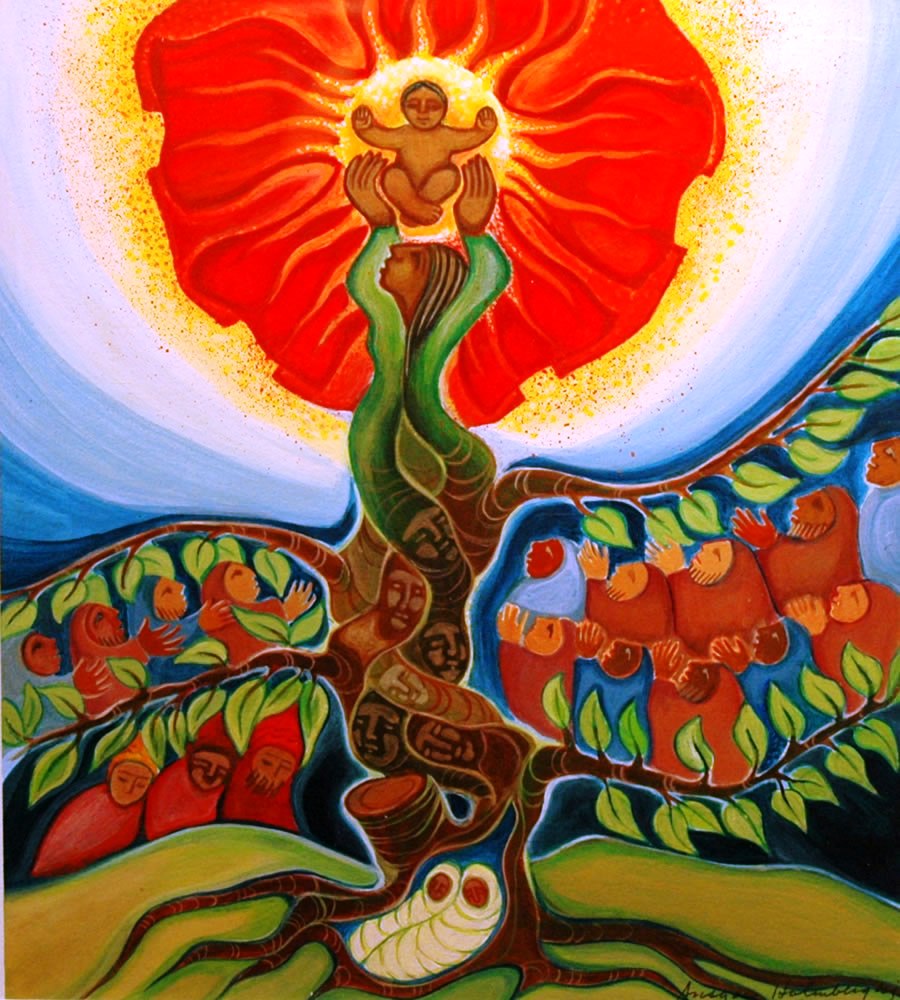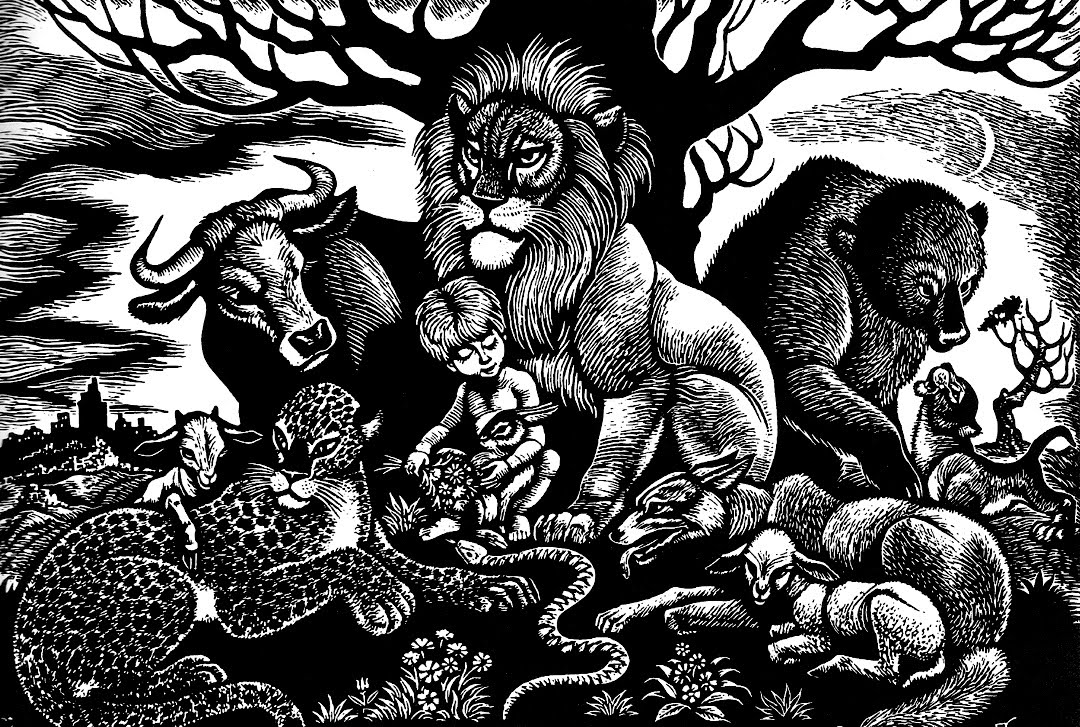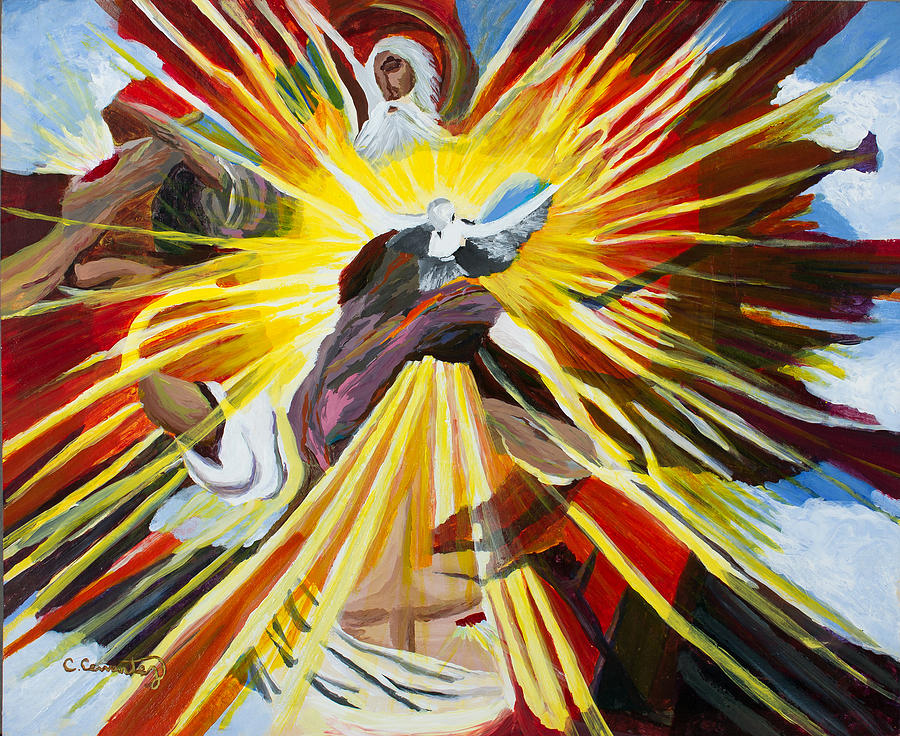Tuesday in the 1st Week of Advent: Isaiah 11:1-10, Luke 10:21-24.
Imagine what it must have been to be a true prophet! Someone like Isaiah, Joel, or Jeremiah – given glimpses of God’s will and the heavenly kingdom. Today we hear an important prophecy of Advent: Isaiah sees Jesus, sprung from the “root of Jesse,” describing him and the world he ushers in. It’s remarkable, especially in light of yesterday’s reflection, because Isaiah describes both the Jesus Christ who comes to the Apostles in the flesh and the Jesus Christ who is the bringer of the Reign of God and end times. As we reflected, this is the same Christ, the same moment of kairos that we anticipate during Advent. Let’s dive into this moment with one of our great prophets, Isaiah, for we, too, participate in the prophetic announcement he makes.
Just as we mark Advent as a time of paring down and preparation, Isaiah foresees that God’s people will be winnowed and devastated before the root of Jesse blossoms. In the chapter prior to today’s reading, Isaiah speaks of God’s wrath at his “godless nation,” those “who make iniquitous decrees, who write oppressive statutes, to turn aside the needy from justice and to rob the poor of my people of their right” (Is 10:1-2a). Isaiah tells them that God uses the Assyrians as “the rod of my anger,” and describes the penance of the Jewish nation as the cutting down of a forest. “Look, the Sovereign, the Lord of hosts, will lop the boughs with terrifying power; the tallest trees will be cut down, and the lofty will be brought low” (Is 10:33). This is truly a penance for sins committed against God, and we can connect our penitential season to this ages-old story among God’s people. Isaiah writes of the completeness of the humbling: “The remnant of the trees of his forest will be so few that a child can write them down” (Is 10:19). This is important! We so rarely take seriously the need for things like fasting, prayer, almsgiving, and humility before our God, but it is emphasized continually in our scriptures. From Abraham taking his son to an altar to Esther, in sackcloth, praying to God for three days to Jesus himself, stripped and beaten and hung on a cross (penance for our sins, not his), we are reminded that penance and supplication are necessary precursors to deliverance. We must ask ourselves how we are participating in penance and preparation this Advent.
Upon this backdrop of a devastated forest, Isaiah foresees a shoot springing from the root of Jesse “and from his roots a bud shall blossom.” This new growth comes from old and revered rootstock: Jesse, grandson of Ruth and Boaz, was from the tribe of Judah and his youngest son was David. Yes, the greatest king of the Israelites sprung from Jesse, but more importantly, many generations later that line of David produces Joseph, Jesus’s father. Genealogy is important in our Judeo-Christian tradition because it shows how God remains true to His People over time and why the passing down of God’s revelation through families is so important.

I find Isaiah’s vision so striking because he is able to perceive the action of the Trinity. “The Spirit of the LORD shall rest upon him: a Spirit of wisdom and of understanding, A Spirit of counsel and of strength, a Spirit of knowledge and of fear of the LORD, and his delight shall be the fear of the LORD.” We’ve all seen people who stand out from others, who have a light in them, who say or do something that seems divinely inspired, even if just for a moment. Imagine what Isaiah sees in Jesus, who is the Son of God, with the Spirit of the Lord indeed resting upon him, instilled in his very being, giving him wisdom, understanding, counsel, strength, and, reciprocally, such a sense of thanks and fealty to his Father that he delights in the fear of the Lord. Great mysteries of the Trinity are revealed to Isaiah in this moment, and he sees the interweaving love of the Three Persons.
After this vision of the Trinity in Christ, Isaiah shares with us a vision of his righteous works: “Not by appearance shall he judge, nor by hearsay shall he decide, But he shall judge the poor with justice, and decide aright for the land’s afflicted.” Here we have a clear statement about how the righteous man (the Messiah, in fact) operates in terms of social justice: a preference for the poor and afflicted, without bias based on appearances. This is echoed in the book of Samuel, which relates how God guided him to choose the next king (David) from among Jesse’s sons: “the Lord said to Samuel [about the oldest son, Eliab], ‘Do not look on his appearance or on the height of his stature, because I have rejected him; for the Lord does not see as mortals see; they look on the outward appearance, but the Lord looks on the heart'” (1 Sam 16:7). God reveals to both prophets, Isaiah and Samuel, how his sight works (it peers into the unseen heart of humans) and how justice should flow from this type of God-bestowed sight and wisdom. It is worth re-reading the chronicles of David in the book of Samuel; we see parallels with Christ and how the Spirit of God dwelt with his Chosen People – specifically in the line of Jesse – in so many eras.
But wait, you might say, perhaps Isaiah is just talking about David in this passage? Let’s get our historical timelines in order. King David made Jerusalem the capital of the united Jewish nation right around 1000 BC. Isaiah didn’t proclaim his prophecies until almost 300 years later, around 740-700 BC! He couldn’t have been talking about David because David was long dead; the kingdom had split between Judah and Israel and was about to be destroyed by the Assyrian empire. The blossoming bud from the root of Jesse is someone farther down the line from David. Isaiah the prophet sees Christ the Messiah, and although he doesn’t know his name, he describes him and the world he ushers in.
Isaiah delivers his prophecy with some beautiful poetry: “with the breath of his lips he shall slay the wicked. Justice shall be the band around his waist, and faithfulness a belt upon his hips.” Indeed, as the incarnate Word of God, Jesus’s every word accuses and condemns wickedness. He is wrapped in justice, and will deliver it in the final judgment, and as for faithfulness, his very incarnation is the manifestation of God’s faithfulness to humanity. Only poetry can strive for the wonder and sheer beauty of this perfect Messiah that Isaiah glimpses in his prophetic vision.
And then Isaiah’s prophecy changes from describing Christ to describing the world that Christ ushers in: “Then the wolf shall be a guest of the lamb, and the leopard shall lie down with the kid; The calf and the young lion shall browse together, with a little child to guide them.” These scenes are certainly miraculous, and, importantly, they describe a world where the needs and desires of the flesh are gone. In their place, peace reigns. The fallenness of our world is no more, in fact the very “rules” under which we think the world operates are confounded. We see nothing of the instinct of hunting creatures or the incompatibility of vulnerability and ingrained predation. Isaiah shows us a deeper reality in creation where all beings share a peaceful spirit.

This scene culminates in the most frightening scene for a parent: “The baby shall play by the cobra’s den, and the child lay his hand on the adder’s lair. There shall be no harm or ruin on all my holy mountain; for the earth shall be filled with knowledge of the LORD, as water covers the sea.” And here, in the place where our human instinct to protect our young from danger merges with the from-the-gut animal instincts we see confounded in the preceding verses, we start to understand that a greater parent provides such powerful love that it conquers animal instinct itself. The Father does not permit “harm or ruin” because His essence infuses all of creation “as water covers the sea.” He perfects creation and removes all violence and conflict, simply through His being. This is the power of God and our ultimate destiny.
How seamlessly Isaiah sees the humanity of Jesus as the bud from the root of Jesse as well as His divinity as the Incarnate Word as well as His kingdom, established in and with the Father’s love that transforms humanity. What Isaiah glimpses is no less than the complete mystery of the Son of God, in his kairos moment of incarnation, life, death, resurrection, and final judgment. This is properly called the Christ Event that descends upon the world and ruptures history like nothing before or after. What an ecstatic vision for Isaiah! How could he even take it in and utter it without the grace of God?
Importantly, this is the very vision we celebrate in Advent. We await the coming not just of the babe but the Christ Event, even while we exist within the reign he began with his sacrifice and resurrection. We exist now within a thread of historical time that is superseded by and subsumed within the great Christ Event that is ongoing.
Turning our attention to today’s gospel from St. Luke, we must have Isaiah’s prophecy in mind. Recall that Isaiah’s first words about this bud from the stump of Jesse are: “The Spirit of the LORD shall rest upon him: a Spirit of wisdom and of understanding.” And how does the gospel start? “Jesus rejoiced in the Holy Spirit.” This is what Isaiah foresees! He glimpsed this and, through Isaiah, the Lord gave us the promise of Christ, who comes with the Spirit of the Lord resting upon him. The gifts of the Spirit are wisdom, understanding, counsel, strength, and knowledge and fear of the Lord. Jesus shares the wisdom and respect for the Lord that the Spirit gives him: “I give you praise, Father, Lord of heaven and earth, for although you have hidden these things from the wise and the learned you have revealed them to the childlike.” This is not the only time in the gospels that Jesus speaks of the blessedness of being childlike. What He means is the openness and naïve trust with which children typically encounter the world. Jesus’s own openness to and trust in His Father have resulted in God’s grace and gifts of the Spirit.
The knowledge that is given to Christ is, in part, the reciprocal nature of His own membership in the Trinity: “All things have been handed over to me by my Father. No one knows who the Son is except the Father, and who the Father is except the Son and anyone to whom the Son wishes to reveal him.” Far from being a prideful or arrogant claim (as the Chief Priests, scribes, and Pharisees might suggest), Christ is trying to share as plainly and truthfully as possible the nature of our Trinitarian God. He is unfolding the mysteries of our faith; mysteries, we must remember, that are integral to our salvation because these mysteries transform and perfect the Jewish tradition into Christianity. Everything must become Christocentric in order for his sacrifice to his Father to make sense to us, so that we can rightfully conform ourselves to the perfect human teacher bestowed upon us, who continues to grace us in the sacraments and throughout our lives.

The import of His revelation is underscored in the final verses from today’s reading: “Turning to the disciples in private he said, ‘Blessed are the eyes that see what you see. For I say to you, many prophets and kings desired to see what you see, but did not see it, and to hear what you hear, but did not hear it.'” There is a profound humility in Christ speaking about this moment in this way. He speaks deferentially to the Spirit and the Father, ascribing to the Father alone the timing and method of revealing His instrument of salvation to the world. Jesus Christ is truly remarkable for me in this moment: when the rest of us would be understandably puffed up with importance to be graced by the Spirit and to find out that we are the gatekeepers for humanity’s salvation, Christ instead offers a gracious and deferential comment to His Apostles. Blessed are you, He confirms. Not “I am one with God! Bow down and kiss my feet!” No, quite the opposite: it’s “how blessed you are to be hearing and seeing God’s unfolding revelation in the Christ Event.” (And, soon he’ll be washing their feet.) If we want an example of how base human nature is transformed by God against every fleshly instinct, here it is. “The baby shall play by the cobra’s den … and there shall be no harm or ruin.” And here our childlike Jesus Christ realizes His Kingship without succumbing to pride or power.
What can we do with such humility?? It seems like I can’t even breathe without thinking of myself. In moments when I read the scriptures and re-discover His perfection, I feel like I can never abase myself enough to be worthy of my Savior. It’s good that it’s Advent. I need time to contemplate my Lord, to remember who this man and God is, to remember that my understanding of the world is circumscribed by silly laws and rules that really have nothing to do with the kingdom God holds for us. The fact that Christ turns to His Apostles in this gospel moment – apostles who were flawed humans just like us – is our sign that He loves us as much as He loves His Father. It reminds me that God’s infinite love and forgiveness is the matrix that will transform all of creation, that it’s not about me, really, and the more I can remember that, perhaps the closer I can be to the Spirit of our Lord.